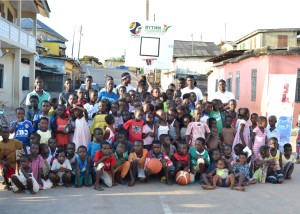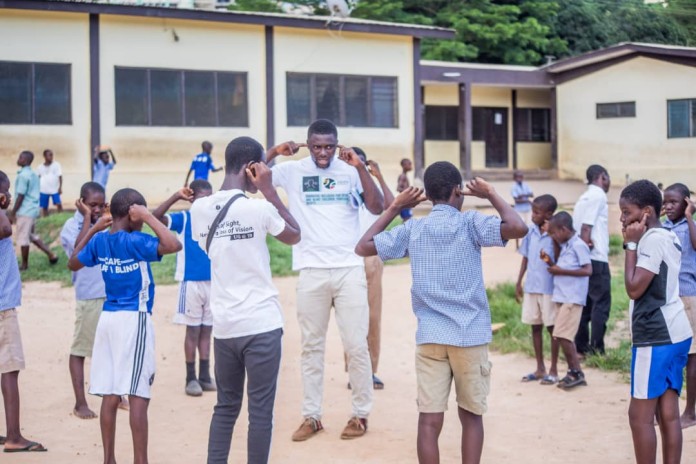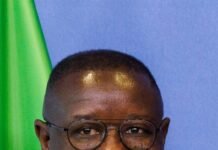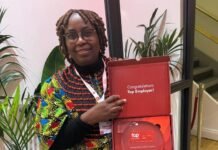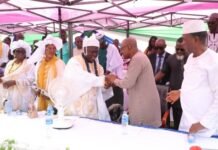By Abubakarr Harding
As part of QNET’s commitment to empowering people to live their best lives, the company advocates for the inclusion of people with disabilities and regularly supports organisations that champion this cause. The African Cooperation of Business Honours recently recognised the tremendous efforts of one such organisation, the ANOPA Project, with its prestigious Charity Organisation of the Year 2022 award.
ANOPA Project, a non-governmental organisation based in Cape Coast, Ghana, provides sports-based intervention that improves the inclusion and integration of vulnerable groups in Sub-Saharan Africa. For the past three years, QNET, a global e-commerce based direct selling company, through its social impact arm, RYTHM Foundation, has been involved in supporting one of the organisation’s flagship projects, ‘Education Through Sports for Deaf and Blind Children’, to build a platform for children with disabilities to learn essential life skills and more through sports education.
This critical initiative empowers hearing and visually impaired children by equipping them with valuable life skills through inclusive, accessible, and quality sports-based programmes. ANOPA Project works to increase school retention rates for these children and teach them social and soft skills through sports activities such as swimming and basketball. In addition, the organisation frequently implements awareness workshops to change social perceptions of people with disabilities.
Mr Biram Fall, Regional General Manager for QNET in Sub-Saharan Africa, says, “QNET and our social impact arm, RYTHM Foundation, have a vision to create a better future for everyone through people empowerment. Building an inclusive society is the first step: the future must include people from all backgrounds and abilities. Accessing high-quality, disability-inclusive education for African youth and children can be difficult due to cultural, economic, and social barriers. That’s why the work that the ANOPA Project is doing is very important in empowering these kids with the skills they need to harness their potential. Congratulations to the team at ANOPA for taking on this noble cause. We are thrilled to be a part of your journey.”
For siblings Adwoa Nyamekye Mensah (8 years old) and Adwoa Enyimpa Mensah (3 years old), who are both hearing impaired, accessing specialised, receiving quality education was challenging due to their financial situation. The pandemic had rendered it difficult for their mother to find work, leaving only their father – a tailor – as the family’s sole breadwinner. Without proper income and given the financial constraints the family was going through, Adwoa Nyamekye was forced to drop out of school.
“I was worried about how he will be able to cope later when he goes back to school. I didn’t want him to fall behind, but we simply could not afford to send him to school,” their father, Ismael Ebo Mensah, said. After receiving a recommendation from a family friend, the family came to ANOPA Project to request for assistance for their children. With support from QNET’s RYTHM Foundation sponsored programme, ANOPA successfully enrolled both siblings at the Cape Coast School for the Deaf and Blind, a government school catering to visual and hearing impaired students. The family was also provided with schooling essentials, such as uniforms, educational materials, and learning accessories to ease their financial burden.
To date, ANOPA Project has helped over 500 children with visual and hearing disabilities realise their full potential by providing support and assistance to schools, creating a conducive learning environment, and removing financial barriers to education.
For people with disabilities, especially young people and children, having good social support systems and inclusive government policies are critical to ensuring they can live independent and fulfilling lives. Unfortunately, that is not the reality for many disabled communities around the world. The World Health Organization (WHO) reports that over 80 per cent of those living with disabilities are from developing countries – Sub-Saharan Africa included. According to the UNICEF 2020 report on child education, 21 per cent of Ghanaian children between ages 5 to 17 live with a disability. They lack access to proper education and personal development opportunities due to the lack of inclusive education policies, access to education funding, and comprehensive social support programmes.
The WHO’s Global Disability Action Plan highlights that adolescents and children with disabilities experience stigmatisation, discrimination, and inequalities. These factors are further exacerbated in lower-income countries as disability and poverty reinforce and perpetuate one another.
Executive Director of ANOPA Project, Mr Ernest Appiah explains, “We believe that children with disabilities must have equal opportunity for high-quality education and social support. We want these children to grow up and live independent and fulfilling lives, contribute to society, and have passion and pride in their identity. Working with QNET and RYTHM Foundation has taken us further in that direction, and we sincerely thank them for their support for these children over the past three years.”
Further demonstrating its commitment to supporting underserved communities, RYTHM Foundation regularly organises a social media-based panel discussion series called RYTHM Connect to create awareness and provide real-world knowledge on pertinent social issues. Its most recent panel, titled ‘Empowering Differently Abled Children Through Sports’, featured the insights and expertise of Mr Appiah on how to encourage differently abled children to use sports activities as a learning tool, and the urgency for empowering all people with disabilities for a better quality of life.
QNET’s commitment to supporting communities worldwide has a powerful history. Since its inception, QNET has stood by its philosophy, Raise Yourself To Help Mankind (RYTHM), and continues to champion multiple social impact projects in over 20 countries that benefit those from marginalised communities through RYTHM Foundation.
